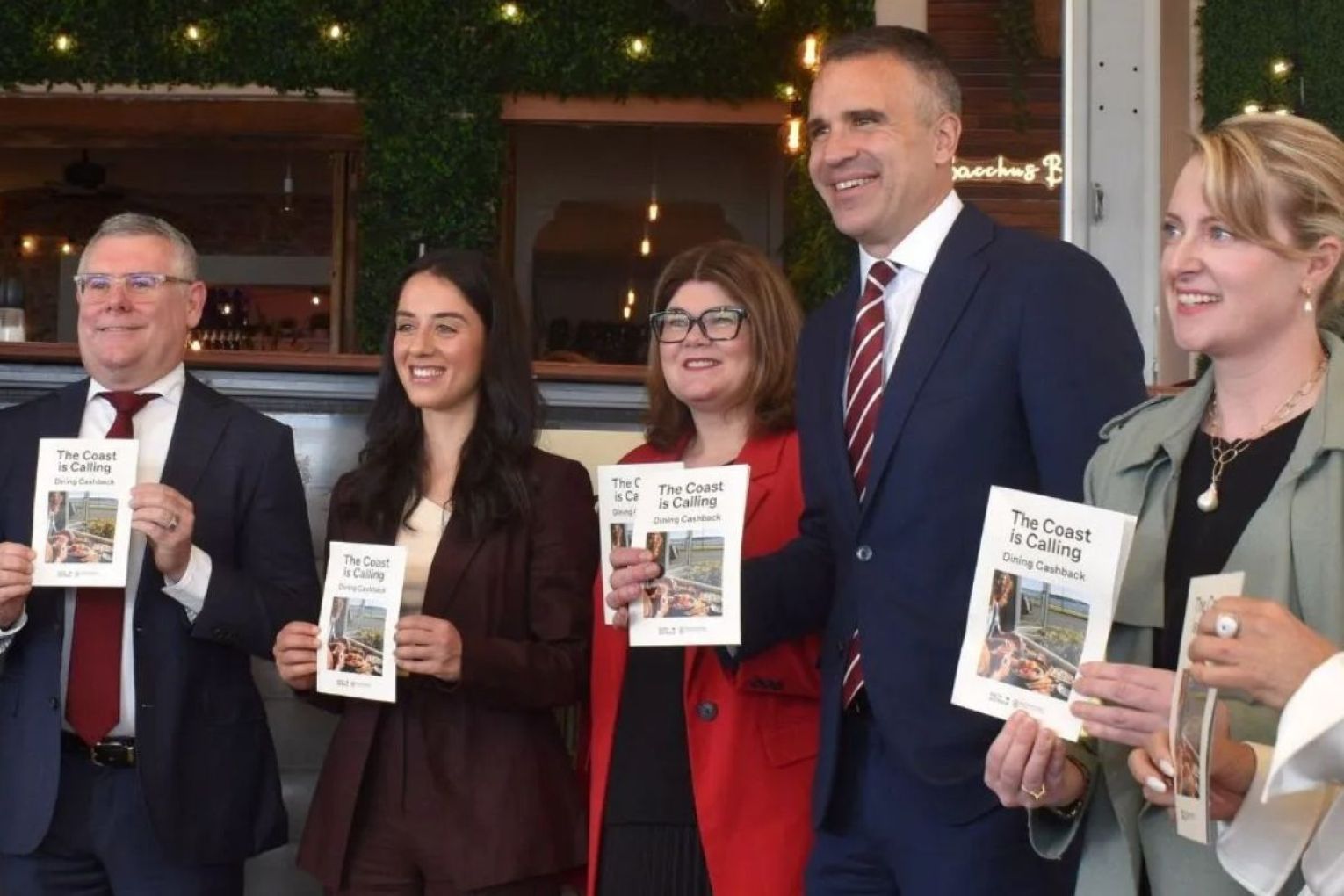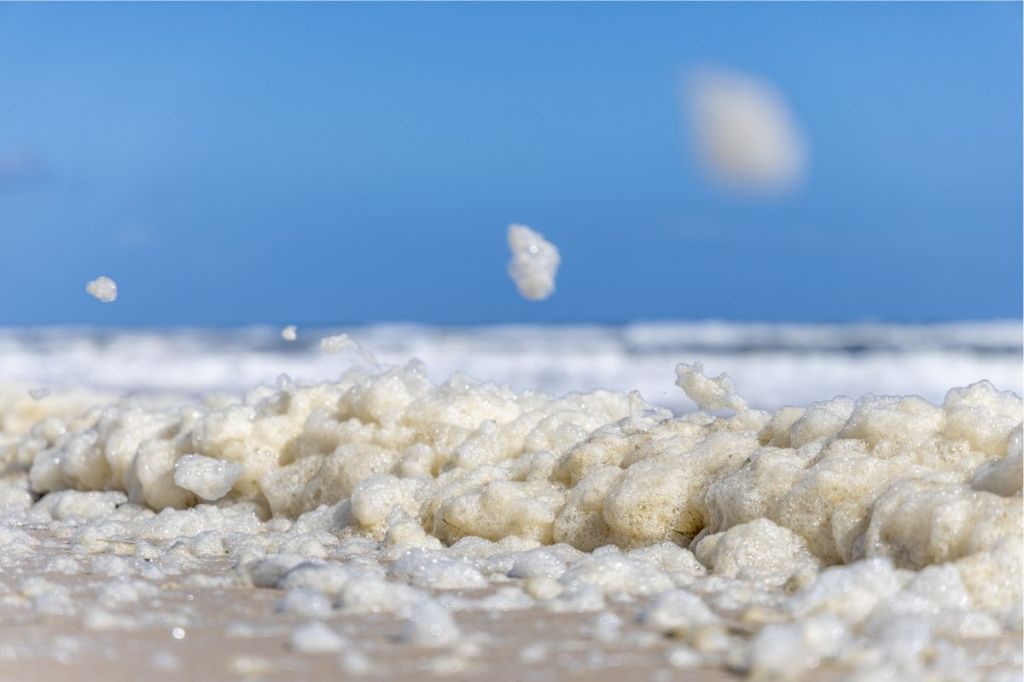Algal bloom summer plan: $15m to bait South Aussies
State and federal ministers plan to feed 300,000 locals in South Australia’s Summer Plan to tackle the devastating impacts of the harmful algal bloom. The government dripped out other plans for a new app outlining beach blooms and safer swimming over the weekend.

State and federal ministers lined up at Henley Beach today to announce a new $15m Coast is Calling – Dining Cashback program to boost numbers at beachside dining businesses suffering customer losses as locals avoid regions struck with the harmful algal bloom.
Ministers unveiled a plan for 300,000 South Australians to get $50 cash back meal payments in a bid to support hospitality businesses alongside an extension to tourism vouchers for accommodation and travel experiences.
“As long as this event goes and of course we all hope it will be over sooner rather than later, but as long as this event goes on, the federal government will be working very closely with the Malinauskas government to support South Australians,” Federal Environment Minister Murray Watt said.
“This program means more people enjoying their local pub or fish and chip shop and more dollars flowing into coastal towns that rely on a strong summer season.”
Watt, along with Premier Peter Malinauskas, SA’s Environment Minister Lucy Hood and SA’s Tourism Minister Zoe Bettison, unveiled the program that would kick off with a first-round public ballot on Monday, November 3, and to be drawn on Monday, November 10.
The dining cashbacks for 60,000 South Australians would have to be used by December 7.
Four more draws of 60,000 cash back vouchers each would be held for dining in December, January, February and March with a ballot draw at the start of each month.
Coast is Calling Travel Vouchers would also be extended into the summer holiday period, with a further 30,000 vouchers for accommodation and experiences.
You might like
“These two schemes will provide a vital boost to coastal tourism and hospitality businesses feeling the effects of the algal bloom,” Premier Peter Malinauskas said.
Those desperate to hear how the government is arresting the environmental impact of the harmful bloom would have to wait, but “not long”, the Premier saying its summer plan is being rolled out in phases.
“There’s so many different elements to it, there’s the community engagement element, which we touched on yesterday, there’s the economic element, which we touched on today, there’s the environmental element that will need to be addressed as well,” he said.
“We’re really determined to leave no stone unturned here, like we’ve been working on this for weeks, all ideas we put on the table, we engage with industry as well, and we just want to leave nothing to chance. There is not an idea we haven’t contemplated; if there is, I’m keen to hear it.”
There was a note of warning from South Australian Business Chamber chief executive Andrew Kay who said the plan must be flexible enough to adapt to changing conditions and support more than “just seafront businesses”.
“Many of our coastal businesses would generate 70 per cent or more of their revenue between October and March,” he said.
“They are yet to experience the true impact of a downturn caused by the algal bloom and few would be in a position to ride out a season of minimal trade without government assistance.
“It will become very apparent, very quickly in the weeks ahead, just what this season will look like for these businesses, with jobs and livelihoods at risk.”

Bacchus Bar owner Jodi Dimond said the $50 cap on the cashback program was fair based on the dining habit she sees at her Henley Beach venue.
Stay informed, daily
“You’ll have two people, our customers probably more around $80 if they buy a platter and a bottle of wine, I think $50 is a really fair assessment,” she said.
“$50 is two cocktails…People want things if they can get it for free because we’re talking about cost-of-living but they’re still trying to support us as well.”
Shadow Minister for Primary Industries, Nicola Centofanti, said the government’s decision to drip feed to Summer Plan was an insult to those worst hit by the bloom.
“The businesses and families significantly impacted by the harmful algal bloom are depending on the Summer Plan to make key decisions about their future,” Dr Centofanti said.
“Many fishers haven’t caught a single fish for months and are already being hit with their next quarterly fees.
“It is cruel to make them wait, even a minute longer than they have to, to find out whether any relief is coming.
“The State Government has one chance to get its Summer Plan right, and they are at risk of fumbling it like they have the whole response.”
New app telling what beaches are best to visit
On the weekend, the government also announced a new Surf Life Saving’ Beachsafe app – backed by record Surf Life Saving beach patrols – giving South Australians daily reports on algal bloom conditions at popular beaches.
Members of the State Government’s beach clean-up crews would conduct visual algal bloom inspections at 23 locations across the metropolitan and southern coast each morning – starting at North Haven all the way down to Goolwa.
The free app and Beachsafe.org.au website would then give information about:
- If the beach is clear of abnormal foam
- If the water is discoloured or not
- What time the beach was last cleaned
Each report will include a fresh picture of the beach, including a view of the water, to provide South Australians with more information on local algal bloom conditions.
Surf Life Saving beach patrols – also funded by the State and Federal Governments – would also be at eight popular beaches having seven-day ‘Between the Flags’ Surf Life Saving patrols all the way through summer.
Want to see more stories from InDaily SA in your Google search results?
- Click here to set InDaily SA as a preferred source.
- Tick the box next to "InDaily SA". That's it.








